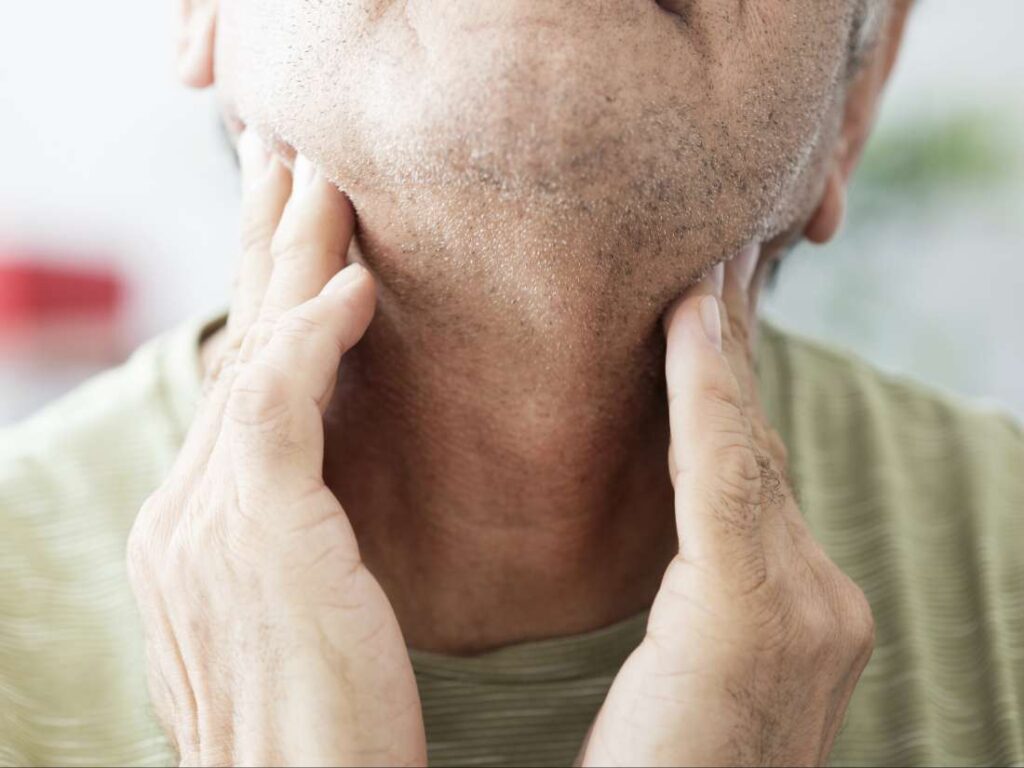

However, one must take care never to administer aspirin to a child, as there is a significant risk for Reye’s syndrome. Over the counter painkillers: Tylenol (Acetaminophen) and anti-inflammatory medications like Advil (Ibuprofen) help in reducing the swelling and inflammation.Warm, wet compresses: Apply to the affected areas for a soothing effect.There are some home remedies that you can try to reduce the pain and discomfort that accompany this condition, like: What are the solutions and treatment options?Īs with many conditions, treatment for swollen glands depends on the cause.
Swollen lymph nodes under jaw skin#
The skin over the gland is warm, red and swollen.Pain or tenderness when pressure is applied.Sore throat, sores in the mouth and/or fever.Some more signs and symptoms of swollen glands are: At this point, we can feel them very easily. However, they may swell up to twice or thrice their usual size when our body is fighting off an illness. Normally, our glands are approximately one-half inch in diameter and we should not feel them. They should be examined by a head and neck specialist. Hard, painless and immovable lymph nodes are usually warning signs of more serious conditions. When the swollen glands are soft, tender and moveable, it typically indicates inflammation or infection. Cancers like Hodgkin’s disease, non-Hodgkin’s lymphoma, leukaemia and breast cancer.Possible side effects from certain medication or vaccines.Immunodeficiency conditions like rheumatoid arthritis (RA), HIV infections and lupus.Sexually transmitted diseases, also known as STDs.

Bacterial infections, including strep throat.Viral infections, including mononucleosis, or “mono”.Swollen lymph nodes may be felt in different areas of the body, like behind the ears, under the jaw, the lower part of the back of the head, armpits and the groin area.įollowing are the most common causes of swollen glands: This condition, though more common among children, may occur among adults as well. Tonsils are lymph tissues and can become swollen and inflamed to fight illnesses like tonsillitis. This keeps the pathogens from spreading further. When lymphatic fluid moves through our body, viruses, bacteria and other harmful substances are trapped by the lymphocytes (immune cells) within the lymph glands and are destroyed. They help our body battle infections and other diseases. We have hundreds of lymph nodes located throughout our body. Lymph nodes are small, bean-shaped masses of tissue components of a large lymphatic system. What are lymph nodes and what is their purpose? This condition is typically characterised by sore throat, headache and fatigue. They may prescribe a treatment, depending on the cause.“Swollen glands” refer to swollen lymph nodes, indicating that the body is fighting an infection or some other type of illness. If you see a GP, they will help identify what is causing the swollen glands. rarely caused by anything more serious, like cancer of the blood system ( leukaemia) or lymph system (lymphoma), or spread of cancer from another part of the body nearby.often caused by common illnesses like colds, tonsillitis and ear or throat infections.But don't self-diagnose – see a GP if you're worried. Causes of swollen glandsīelow are some of the most common causes of swollen glands.
/swollen-glands-5844c5643df78c02303e3393.jpg)
You should go to your nearest emergency department or call 999 for an ambulance if you have swollen glands and you're finding it very difficult to breathe, or difficult to swallow your own saliva (causing you to drool).


 0 kommentar(er)
0 kommentar(er)
